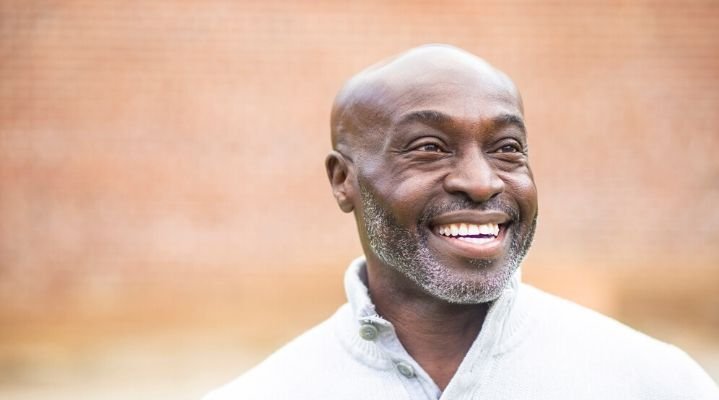Health Hub
Men’s health: attitudes are still changing for the better, but we’re not there yet
Checked for accuracy by Dr Ian Cole

Men are happy to visit their GP for a mental health problem. But a shortage of healthcare access and poor information mean that men aren’t always making the right choices.
A recent survey commissioned by King Edward VII’s Hospital (2019) has highlighted that men’s attitudes towards health are changing in positive ways, but that more can be done and stigma still persists.
Men’s health awareness is greater
Campaigns such as Movember continue to do wonders in encouraging open discussion around men’s health — as well as raising awareness around diseases such as testicular cancer.
In fact, our survey revealed that only 5% of men don’t know how to check themselves for testicular cancer.
It’s also good news for mental health, with more than 50% of men saying they would visit their GP with a mental health concern.
Of course, that means that half of men are still unwilling to address their mental health issues. And large numbers of men reported that they wouldn’t go to the GP if they were urinating more than usual or if they discovered a lump, despite the fact that these can potentially be symptoms of significant illnesses. So, although progress has been made in raising men’s health awareness, there is still a long way to go.
Our survey has also revealed that, while awareness might be improving, men aren’t always worrying about the right thing when it comes to their health.
Men’s health worries
As part of the survey we commissioned, we asked men about the health conditions that worried them most, and the results were surprising.
Top health concerns across men aged 18-99:
- Prostate cancer
- Bowel cancer
- Heart disease
- Testicular cancer
- Kidney stones
- Injury
- STIs
- Breast cancer
Men don’t always have the right health concerns

Our survey revealed 18-34 year olds worry about prostate cancer just as much as 35-54 year olds do, despite the fact that prostate cancer is far more likely to affect older men.
However, this attitude changes as men get older. The top three worries for men aged 55-99 were found to be:
- Prostate cancer
- Bowel cancer
- Heart disease
Given current mortality rates of testicular cancer are highest for males aged 50-54, it is rather surprising men in later life don’t appear as concerned about it. There are around 65 deaths from testicular cancer in the UK every year.
Yet, when asked which medical conditions worry them, our survey revealed that men aged 35-44 worry 51% more about testicular cancer than men aged 55-99.
Interestingly, although breast cancer is relatively rare for men compared to women, (390 men are diagnosed each year versus 54,800 cases in women), it shouldn’t be dismissed.
Our survey found that men aged 25-34 are more worried about breast cancer than any other age group. Yet, most men are diagnosed with breast cancer are between 60-70 years of age — the age group found in this survey to be the least worried about breast cancer.
This may have something to do with national breast cancer screening programmes for women and the high profile attention breast cancer receives — and the stigma for many men going through breast cancers, whether rare or not, is not helping matters.
This is concerning when we consider that 23% of men say they would avoid going to the doctor if they found an unusual lump in their body.
A common theme emerges from this information: men don’t always know how much of a risk a health issue poses, leading them to worry about the wrong things. This is why raising awareness around men’s health is so important; men can’t always access the health advice that they need.
Equipping men with necessary health information
It’s vital that health information is available alongside awareness campaigns. And while campaigns such as Movember have made a huge difference, there is still a long way to go.
For instance, while over 1 in 2 men fear prostate cancer, not all men are totally clued up about their prostate. When our survey presented a diagram of the human body, 1 in 10 men failed to correctly identify the prostate.
This kind of misunderstanding, or lack of understanding altogether, can present a serious risk to men’s health because men won’t necessarily lean on the expertise of a health professional; when responding to our survey, almost a quarter of men said they don’t visit their GP because getting an appointment was a hassle.
The GP appointment experience for men
With GP appointment waiting times reaching an average of two weeks, it’s no surprise that men say that getting an appointment is a hassle.
Yet, most men across the UK say they would go for an annual health MOT (88%).
This stands in contrast to pervasive stereotypes that might imply men are too “lazy” to see their GP and are not willing to open up.
What’s more, men are not averse to going to see the GP about their mental health either.
In fact, our survey found more men go to the doctor about their mental health than they do their physical health; 55% of men go to the doctor for a physical health concern versus 57% for a mental health concern.
The survey also revealed that younger men (aged 18-44) are more willing to go to the GP with their mental health concerns, more so than for a physical injury. The opposite was found to be true for men aged between 45-99 years old.
As such, there is no real distinction between physical and mental health in men’s attitudes to their health. This is encouraging as attitudes towards mental health continue to improve in our society.
But while men might be willing to visit their GP, this willingness doesn’t last forever. A bad experience can put men off from returning to their GP.
In fact, 1 in 10 men cite a bad previous experience as a reason to not go to their GP. This rises to as many as 1 in 5 for younger men. And over a quarter of men have appointment anxiety when they do book.
With too many men (24%) ignoring treatable yet potentially life threatening symptoms such as lumps, this leads to men taking risks with their health or not receiving the support they need in times of crisis.
And men do still feel embarrassed to go to their GP about a medical concern that affects their sexual health: our survey found that men are less willing to see a GP about Erectile Dysfunction.
This is concerning, because over a quarter of men (26%) report feeling that their sexual health issue has impacted their mental wellbeing. And 1 in 5 men will ignore the problem hoping it will just get better by itself.

Dr Ian Cole at King Edward VII’s Hospital has observed similar, “I still see men regularly that are embarrassed and anxious about their sexual health.”
“To help them manage this, many patients will have a partner with them, or their appointment is booked by a partner or a friend. This has changed over the years… And it just goes to show how support can mean more men get checked out regularly and reduce unnecessary worry.”
“This is so important to highlight because many urological issues for men can be easily treated, and most do not mean cancer.”
They continued, “where cancer is diagnosed, it’s thanks to these men making that initial step into their consultant’s office, that we can now see really encouraging improvements in survival rates for common cancers in all men too, so these men are not just helping themselves when they prioritise their health.”
And, hospital experiences matter too.
18-24 year olds consider how easy it is for family to visit one of the most important things that can make the experience of a hospital stay better for them, but men’s priorities appear to change as men age.
55-99 year-olds consider family visits only just above the quality of the food!
And although the quality of hospital food has become a bit of a target in the media, it’s positive to see national changes that look to support patients with their diet as an important factor in health and recovery.
Interestingly, while diet is important to recovery, what the food is like came out as the least important factor overall to a good hospital experience for men. This was closely followed by what the aftercare is like.
For older men it was certainly medicine over Michelin, with the most important factor to a positive hospital experience being how experienced the staff are. This was closely followed by how attentive the staff are.
For younger men, it was how easy it is for family to visit, followed by how kind the staff are.
Unfortunately, lengthy delays can affect hospitals as much as GP surgeries.
Recent news has highlighted how patients continue to be added to waiting lists for various treatments due to demand.
So, if men decide not to make use of healthcare systems, whether from embarrassment, frustration, or from a negative experience, where are they taking their health concerns?
The rise of 24/7 health access: a necessary solution?
Given the pressures facing GPs and hospitals, it is perhaps unsurprising that many men might see online healthcare options and self-diagnosis as a faster route to treatment.
The age of self-diagnosis
Our survey revealed that 76% of men look up their symptoms online (as many as 92% in men aged 18-34), with 24% even purchasing medicines to treat themselves without consulting a medical professional.
Half of men under 34 say they would buy medicine online rather than see their GP.
We know that Googling symptoms can often lead to misdiagnosis and more anxiety in men. As the group most likely to check their symptoms online, 25-34 year old men were found to be the most worried age group overall when it comes to their health.
This contrasts with older generations. Less likely to turn to the Internet with their health concerns, 45-99 year olds were found to be the least worried about health conditions overall but more worried about common conditions that become a greater risk with age, such as prostate cancer and bowel cancer.
What are men searching for?
Google trends show web searches for men’s health concerns like prostate cancer rising overall, with noticeable uplifts in people turning to platforms like YouTube to symptom check and watch video content to inform themselves.
Searches for mental health on YouTube is rising steadily, and trumps searches such as heart disease.
This survey has found the health concerns most likely to drive men to the Internet are:
- Prostate cancer
- Peeing more than usual
- Body/muscular issues
Attitudes towards alternative therapies
With men turning to alternative sources for their healthcare information, perhaps it isn’t much of a surprise that they are also open to alternative therapies.
Our survey revealed that 1 in 2 men are open to trying CBD oil. Given the main uses currently of CBD oil are for cancer, pain relief and mental health purposes, this makes sense.
We can see searches for newer and perhaps more taboo therapies like CBD oil rising generally across the web, and as a rising search related to prostate cancer in Google, alongside topics like preventative healthcare.
We know prevention can reduce costs, and improve outcomes. And, men are increasingly proactive about their own health.
Top three ways men manage their health overall:
- Online search
- Ordering prescriptions and purchasing online
- Using fitness trackers, eg heart monitor, smartwatch; nearly 1 in 2 men aged 18-34 use some form of fitness tracker
Men’s exercise habits, and making time for self care
This trend of turning to the Internet, technology does have one positive side-effect: an awareness of the importance of exercise.
It’s almost impossible to find a popular healthcare article that doesn’t, at some point, state the importance of regular exercise, and our survey reveals that the message is hitting home: almost a third (31%) of men say they exercise 5 days a week or more.
With obesity rising across the UK male population, and drinking and drug related deaths on the rise too, lifestyle has a significant impact on men’s health.
And with over a quarter of men working in offices, with a culture of overtime and limited opportunity for flexible working, it’s not always easy for men to be as healthy as they want.
This might explain why 1 in 5 men admit to doing no exercise at all each week. For 18-24 year olds, this figure is 1 in 10.
Building men’s confidence
While the motivation for men to be proactive towards their health is there, there’s more that can be done to empower men to act sooner and prioritise their health and habits.
Over a third of UK men admit to never checking themselves for testicular cancer. While many men do check, out of these 1 in 5 are unsure they have done it properly.
This shows us that awareness drives are having an impact but, in order to make a difference, men need to know what they need to do and when — in particular where there is no current national scheme in place to empower men to act.

Supporting and saving the lives of more men
It would be easy to ignore the issues raised by our survey and allow men to keep self-diagnosing or avoiding their GP surgery.
But, aside from potentially misdiagnosing themselves, or even purchasing incorrect or ineffective medication and alternative therapies, these options aren’t available to all men.
There are many who can’t afford to buy medication or alternative therapies, and many who cannot afford even basic Internet access.
There are also many men who are homeless, with restricted, or even zero, access to basic support and self care options. In fact, the average life expectancy of a homeless person, is just 44 years old. In other words, they enjoy the life expectancy of a man in the 1800s.
While significant stigma and stereotypes remain that continue to marginalise certain groups of men in our society, the pace of change will be steady.
But it needn’t be this way.
Men from all backgrounds need support, and this is just one area King Edward VII’s Hospital works hard in helping to achieve.
It’s not just how much we invest in men’s health that matters; it’s where it is invested and how we deliver that care too. And, as we can see from this survey and the trends in our current climate, it matters that we consider the picture as a much greater whole.
And age shouldn’t be a barrier, we can break down generational stereotypes and start having meaningful conversations about health.
Let’s end stigma in men’s health. Together.
Article Sections
Latest Hospital News
Should you wish to speak to our press team, please visit Press Enquiries




